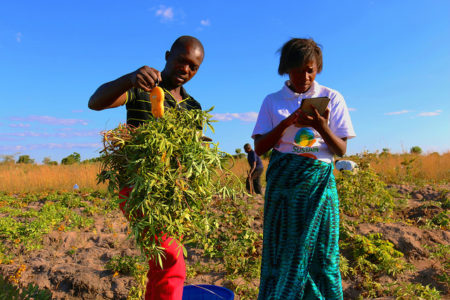Article by Netsayi Mudege

A recent paper published by scientists from the International Potato Center (CIP), using a case study from Malawi, has revealed how gender relations shape men and women’s access to and participation in agricultural training. The paper also examined how men and women justify or challenge gender inequalities in relation to access to agricultural information and knowledge. Having evidence on how gender relations shape access to knowledge and information is important to develop gender responsive and inclusive extension systems.
This article is based on a gender analysis of sweetpotato seed systems conducted in Phalombe and Chikwawa districts in Malawi in 2013 and 2014. The study used the Irish Aid funded Rooting Out Hunger in Malawi with Nutritious Orange-Fleshed Sweetpotato as an entry point into the study villages.
The paper shows that in many cases dominant perceptions may prevent men or women from getting the information and training they need. For example, on one hand men are often targeted with agronomic training compared to women although women also contribute to production of crops. On the other hand, men are left out of nutritional training although they often make decisions including land allocation to crops which can also impact on family nutritional status.
In many cases dominant perceptions in the communities under study are that:
- Men are heads of households therefore should attend production training on behalf of their households. They in turn will be able to instruct other household members on what to do
- Women are care givers and mothers therefore should be targeted with nutrition training
- Women may not understand because they are not educated so it is better for the male head of household to attend agronomic training to get the correct information
These perceptions affect access to training in many ways. For example, men are willing to allow women to attend nutrition related training which is regarded as commensurate with their roles but may be less willing to allow them to attend other agricultural training. These community perceptions sometimes influence how extension services operate. In some cases, while women may want to access training, extension officers may reinforce gender stereotypes by inviting men for agronomic training and women for nutrition. There is also an information hierarchy whereby information acquired by men is regarded as more valuable than information acquired by women. For example, when men disseminate information from agronomic training they are regarded as ‘demonstrators’ while when women do the same for nutrition information they are regarded more passively as ‘food displayers’.
Even in the face of extension services reform promoting gender responsiveness, extension workers may not have the tools and knowledge they need to engage with both men and women in an equitable manner. Thus in some cases where men and women may wish to challenge existing gender division of roles by attending either agronomic or nutrition training they may not find support from extension workers who use biased training selection and recruitment methods.
The lack of involvement of women in training is a major challenge to technology adoption as well as their ability to benefit from agricultural technologies. In many sub Saharan Africa countries women provide labour in terms of planting, weeding, application of fertilizer and general maintenance and monitoring of crops. However, they may not be targeted with the training they need to improve their agricultural knowledge and practices resulting in poor productivity.
The paper concludes by stating that the physical and institutional context in which extension takes place needs to be understood and necessary adjustments made to either learning approaches or institutional contexts to ensure that both men and women are able to access information and learning. For example, addressing structural factors such as women’s lack of education may be beyond the scope of most agricultural interventions, but projects could integrate inclusive approaches that are friendly to less literate people; such as women.
